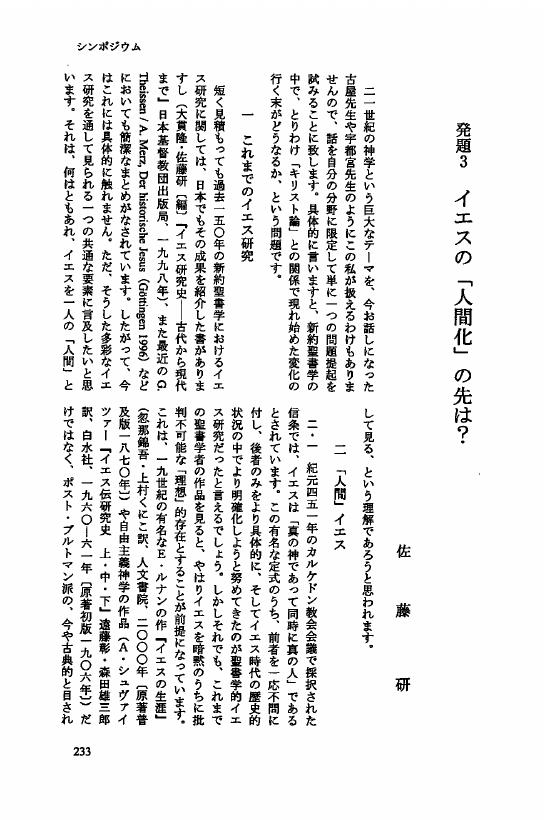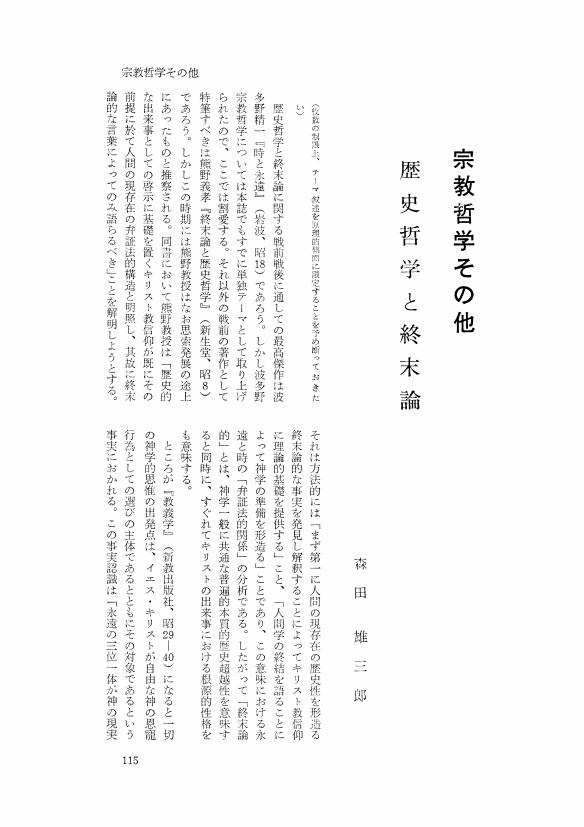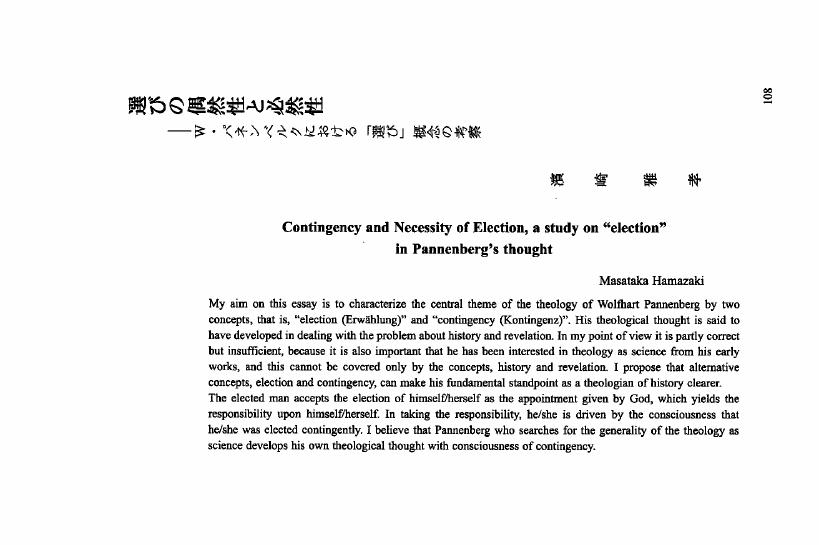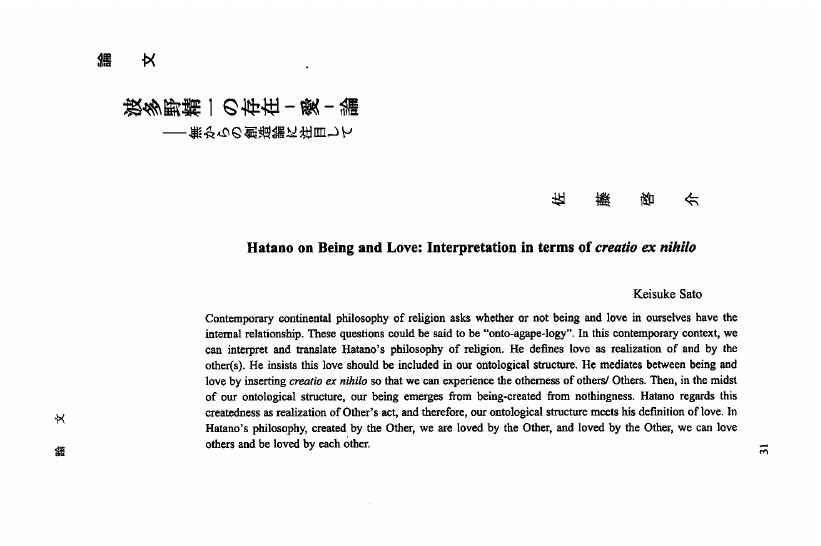1 0 0 0 OA 発題2 聖書学の立場から
- 著者
- 山我 哲雄
- 出版者
- 日本基督教学会
- 雑誌
- 日本の神学 (ISSN:02854848)
- 巻号頁・発行日
- vol.2007, no.46, pp.249-253, 2007-09-20 (Released:2009-10-23)
- 著者
- 佐藤 敏夫
- 出版者
- 日本基督教学会
- 雑誌
- 日本の神学 (ISSN:02854848)
- 巻号頁・発行日
- vol.1993, no.32, pp.162-167, 1993-10-05 (Released:2009-10-23)
1 0 0 0 OA 発題3 イエスの「人間化」の先は?
- 著者
- 佐藤 研
- 出版者
- 日本基督教学会
- 雑誌
- 日本の神学 (ISSN:02854848)
- 巻号頁・発行日
- vol.2002, no.41, pp.233-238, 2002-09-20 (Released:2009-10-23)
- 著者
- 芦名 定道
- 出版者
- 日本基督教学会
- 雑誌
- 日本の神学 (ISSN:02854848)
- 巻号頁・発行日
- no.48, pp.en26-en29, 2009
1 0 0 0 OA 半田元夫・今野国雄著『キリスト教史I、宗教改革以前』(山川出版社、一九七七年、五〇四頁+二八頁) 藤代泰三著『キリスト教史』(日本YMCA同盟出版部、一九七九年、六三二頁+四六頁) 歴史神学
- 著者
- 宮谷 宣史
- 出版者
- 日本基督教学会
- 雑誌
- 日本の神学 (ISSN:02854848)
- 巻号頁・発行日
- vol.1980, no.19, pp.107-112, 1980-12-25 (Released:2009-09-16)
- 被引用文献数
- 1
1 0 0 0 OA 吉村善夫著『現代の神学と日本の宣教』
- 著者
- 佐藤 敏夫
- 出版者
- 日本基督教学会
- 雑誌
- 日本の神学 (ISSN:02854848)
- 巻号頁・発行日
- vol.1965, no.4, pp.74-80, 1965-09-15 (Released:2009-09-16)
- 被引用文献数
- 1
1 0 0 0 パウロの贖罪論のもう一つの次元
- 著者
- 太田 修司
- 出版者
- 日本基督教学会
- 雑誌
- 日本の神学 (ISSN:02854848)
- 巻号頁・発行日
- vol.1995, no.34, pp.45-63, 1995
1 0 0 0 OA 初期ユダヤ教とルカ文書における「知恵」の一側面
- 著者
- 大澤 香
- 出版者
- 日本基督教学会
- 雑誌
- 日本の神学 (ISSN:02854848)
- 巻号頁・発行日
- vol.56, pp.9-31, 2017-09-25 (Released:2019-06-05)
- 参考文献数
- 28
The “God-Fearers” in Luke have been thought of as gentile sympathizers. In the context of ancient Israel, “Fear of YHWH” was strongly connected with Israelite observance of the Law of YHWH. How did such an important concept in the piety of Israel and Jewish identity come to describe gentile believers? Investigation of the interpretation of this phrase in the Second Temple period gives us an important clue. In the Second Temple period there seems to have been a consensus that love of God was superior to fear of God. From the examples in the Second Temple period, there must have been a common understanding of “God-Fearers” as referring to gentile believers before Luke. But it appears that in Acts, Luke deliberately put “God-Fearer” and “God-Worshiper” in the story as a literary strategy, using the sense of “God-Fearers” as connoting religious piety continuing from ancient Israel, to mitigate the peripherality of gentile believers.
1 0 0 0 OA 歴史哲学と終末論
- 著者
- 森田 雄三郎
- 出版者
- 日本基督教学会
- 雑誌
- 日本の神学 (ISSN:02854848)
- 巻号頁・発行日
- vol.1967, no.6, pp.115-120, 1967 (Released:2009-09-16)
1 0 0 0 OA 瀧沢克己著『仏教とキリスト教』を読む
- 著者
- 片山 正直
- 出版者
- 日本基督教学会
- 雑誌
- 日本の神学 (ISSN:02854848)
- 巻号頁・発行日
- vol.1965, no.4, pp.80-86, 1965-09-15 (Released:2009-09-16)
1 0 0 0 OA オリゲネスの聖書解釈法
- 著者
- ネメシェギ
- 出版者
- 日本基督教学会
- 雑誌
- 日本の神学 (ISSN:02854848)
- 巻号頁・発行日
- vol.1966, no.5, pp.115-125, 1966-09-15 (Released:2009-09-16)
- 参考文献数
- 56
1 0 0 0 森本あんり著『反知性主義―アメリカが生んだ「熱病」の正体』
1 0 0 0 OA Godの訳語「上帝」
- 著者
- 金 香花
- 出版者
- 日本基督教学会
- 雑誌
- 日本の神学 (ISSN:02854848)
- 巻号頁・発行日
- vol.55, pp.67-96, 2016 (Released:2018-02-22)
The Term Question is from the process of translating the Bible into the Chinese. Nowadays, there are two versions of the translation of “God” in Chinese, one is Shangdi, the other is Shen. According to the missionaries, the question is unsolved. In this paper, the problem of the translating “God” into the Chinese, the Japanese and the Korean languages be considered one question. It try to prove the validity of the argument from three points. First, the point of the controversy of the Term Question. Second, the literary language of the Chinese, the Japanese and the Korean. Third, the principles of translation of the Bible translators. Considering the Term Question in the three languages enables a new understanding to the question, that the coexistence of Shangdi and Shen is a proper answer.
1 0 0 0 日本におけるドストエフスキー受容と「研究」
- 著者
- 松本 昌子
- 出版者
- 日本基督教学会
- 雑誌
- 日本の神学 (ISSN:02854848)
- 巻号頁・発行日
- vol.1982, no.21, pp.126-147, 1982
1 0 0 0 OA キリスト教と近代日本文学
- 著者
- 笹淵 友一
- 出版者
- 日本基督教学会
- 雑誌
- 日本の神学 (ISSN:02854848)
- 巻号頁・発行日
- vol.1963, no.2, pp.153-158, 1963-08-10 (Released:2009-09-16)
1 0 0 0 OA 選びの偶然性と必然性
- 著者
- 濱崎 雅孝
- 出版者
- 日本基督教学会
- 雑誌
- 日本の神学 (ISSN:02854848)
- 巻号頁・発行日
- vol.2006, no.45, pp.108-125, 2006-09-21 (Released:2009-10-23)
- 参考文献数
- 20
1 0 0 0 OA 書評(名尾耕作著『旧約聖書ヘブル語大辞典』(聖文舎、一九八二年、一四八六頁))
- 著者
- 栗谷川 福子
- 出版者
- 日本基督教学会
- 雑誌
- 日本の神学 (ISSN:02854848)
- 巻号頁・発行日
- vol.1984, no.23, pp.90-99, 1984-12-25 (Released:2009-10-23)
- 参考文献数
- 5
1 0 0 0 OA 発題2 照明と恩恵
- 著者
- 片柳 栄一
- 出版者
- 日本基督教学会
- 雑誌
- 日本の神学 (ISSN:02854848)
- 巻号頁・発行日
- vol.2000, no.39, pp.175-179, 2000-10-10 (Released:2009-10-23)
- 参考文献数
- 8
1 0 0 0 OA 波多野精一の存在-愛-論
- 著者
- 佐藤 啓介
- 出版者
- 日本基督教学会
- 雑誌
- 日本の神学 (ISSN:02854848)
- 巻号頁・発行日
- vol.2007, no.46, pp.31-52, 2007-09-20 (Released:2009-10-23)
- 参考文献数
- 59
1 0 0 0 OA 「ロザリオの祈り」にみるキリスト中心主義
- 著者
- 西脇 純
- 出版者
- 日本基督教学会
- 雑誌
- 日本の神学 (ISSN:02854848)
- 巻号頁・発行日
- vol.2004, no.43, pp.9-31, 2004-10-07 (Released:2009-10-23)
- 参考文献数
- 36













